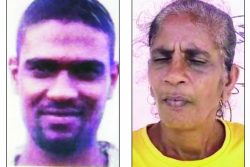Christmas Day generally ends in a joyful mood but for the family of Jeewan Deonaraine it concluded in mourning after he was struck down on the Lusignan Public Road by a driver who was purportedly under the influence of alcohol.
The man was killed on Christmas Day last year and even though the driver was suspected to have been drunk there is no way for his family or even the police to prove that he was driving while intoxicated (DUI).
So should the driver be taken to court he would be charged with causing death by dangerous driving with no mention being made of his alleged alcohol consumption level and so Deonarine’s family may feel that justice wasn’t served.
No DUI charge
Unfortunately, their grief and the perceived injustice is quite common as many Guyanese who would have lost loved ones in road accidents or suffered injuries do not get justice since many drivers who were under the influence don’t have to face a DUI charge.
Nothing is enshrined in the laws of Guyana to deal with driving under the influence nor do the police have the equipment or authority to test the level of alcohol in someone’s system when they are involved in an accident.
The main reason why the breathalyzer, used to determine the level of alcohol in one’s system, is not being introduced as yet according to Denise Dias of the Mothers in Black organization and Alicea Foundation is because the authorities have not decided what should be the legal level of alcohol for a driver.
According to Dias the last word she heard was from acting Commissioner of Police Henry Greene who stated that they are in the process of looking at it since they have received details from Jamaica, Trinidad and Tobago and Barbados. All three countries have introduced the breathalyzer law.
Breathalyzer
legislation
The issue of the breathalyzer has been on the agenda for a while since Ronald Gajraj was Minister of Home Affairs but the final draft of the appropriate legislation is yet to be completed.
Dias told this newspaper that Greene told her that the draft would soon be completed and sent to parliament and she feels that once the breathalyzer is enforced it would a send a strong message to drivers that they should not drink and drive.
She noted that heavy drinking in the Caribbean is commonplace and some people can drink from morning till night but persons need to understand that when they drink they need to have a designated driver.
She called on the police to make a recommendation that there be high penalties for drunken driving. However, she acknowledged that in all fairness to the lawmen they cannot do anything until the law is passed.
Dias is somewhat pessimistic about when the draft legislation would be completed as she noted that there is a shortage of legal draftsmen at the attorney-general’s office and it would be good if some help could be received in that area.
The impact of alcohol on road accidents has become even more of an issue as road fatalities have been on the increase with some 12 persons being killed on the country’s roadways to date.
For last year 183 persons lost their lives in traffic accidents, mainly as a result of reckless driving and dark roadways, Traffic Chief Roland Alleyne had stated.
Eighty-six of the 165 fatal accidents last year occurred at night and 79 during the day, accounting for the lives of 144 males and 38 females.
Alleyne had told this newspaper earlier this month that he was perturbed at the figures and stressed that drivers and pedestrians alike had to be more careful when using the roads. “These guys are just speeding and not even looking out for anyone,” he had said.
When Stabroek News contacted Alleyne on the issue of driving under the influence he stated that he could not give an interview as he was very busy but suggested that the reporter should contact him this week.
Last year October on this issue the Traffic Chief had urged drivers not to drink and drive. “We are depending on you to save the lives of the people who have entrusted you with their lives,” he had said.
Dias, who has been at the forefront of the fight for safer roads after losing her daughter in a traffic accident some years ago, said that much more needs to be done on road safety here and it should be made a priority by government. She said from November last year, which ironically was Road Safety Month, there has been a road crash every week and drunken driving must be factored in. But she noted that another issue that may be contributing to road accidents is the number of vehicles on the country’s roadways. She said that many persons criticize minibus drivers but there are quite a few of them who are careful drivers and the reason it looks as if they are more reckless is because they have more persons’ lives at stake. However, she said, figures have actually shown that drivers of private vehicles cause more accidents.
Vigil for breathalyzer
Dias’ Mothers in Black organization, which involves both males and females who had been affected by road accidents, has recently restarted their vigil opposite Public Buildings with the aim of making the breathalyzer a reality. She said that they came off the road in 2003 but to date nothing has happened in that area so they have decided to start the campaign again after they were successful with the seat belt effort. Emphasis, she said, must be placed on drinking and driving and speeding.
She said recklessness on the roads can have an impact on the country’s tourism potential. “Who is going to want to visit us when we have animals behind the wheels of our vehicles?” Another sore point is that there are no traffic lights in the country but she said she has been assured that by March lights would be in place again. “But if they don’t implement all the other things to make our roads (safer) the lights are going to be knocked down again.”
“Road safety is everybody’s business. It is getting closer to home as everyone would soon have a relative or friend who may have died in an accident or were injured. It is our number one killer






